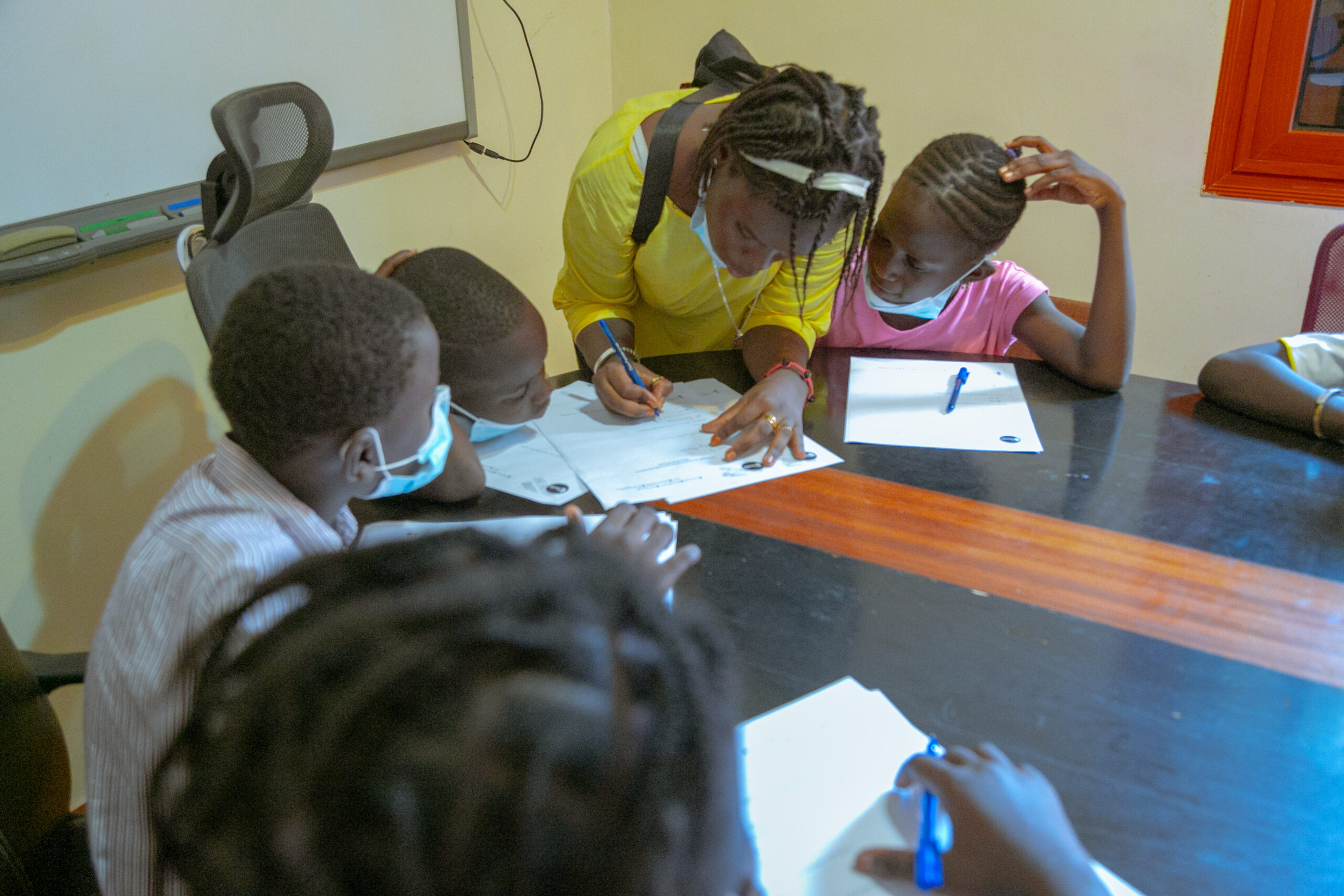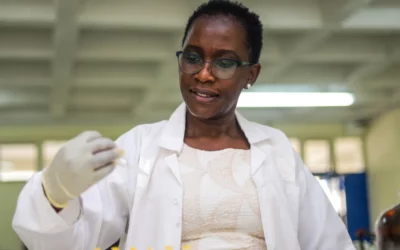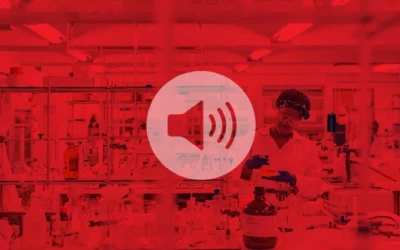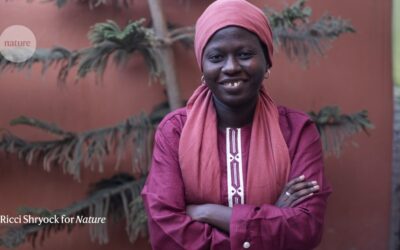By Bilal Taïrou for Scidev.net
The African scientific world is increasingly enriched by women determined to actively participate in making science the driving force of the continent’s development.
Khadidiatou SALL, molecular and cellular biologist, ambassador of the Next Einstein Forum (NEF) for Senegal and founder of the association Science education exchange for sustainable development (SeeSD) since 2016, is part of this new generation of determined women.
With her association, this young woman is committed to promoting science, technology, engineering, art and mathematics (STEAM – Science, Technology, Engeniering, Art and Mathematics) to young people.
“When you give a child a mathematical problem in French, they can’t solve it. However, it solves the same problem, posed in local language”
Khadidiatou Sall, NEF Ambassador in Senegal
This year alone, she has already mentored over 200 students through hands-on workshops on biology, physics, chemistry, 3D printing, coding and electronics.
SciDev.Net talks to Khadidiatou SALL about her journey, her research and the obstacles she had to overcome to get to where she is today.
What were your motivations for embracing a scientific sector?
I was a little girl who was curious and loved to discover new things. As a small child, I often had fun making my own toys, and as I grew older, I realized that I had biology skills, which turned out to be a subject that wasn’t difficult for me. That’s how I became a biologist after that.
What is the basic need for your research?
I am much more focused on climate change and my research addresses the need to create plant varieties that are resilient to drought and climate change. That is why the theme of water is of paramount importance to me. I think that in the years to come, the water content will continue to decrease. It is therefore necessary to find genes that can be modified to create plants that are much more tolerant to certain stresses, especially drought.
What follow-up do you hope will be given to your research?
What I’m looking for is more collaboration from governments and the private sector to develop and use that research. What we often do is basic research that can nevertheless be used to create concrete things. The goal of doing this type of research is to advance science, and at the same time, solve problems.
You talked earlier about genes that could be changed. Given the general reluctance of the populations in the face of genetically modified organisms (GMOs), are you not afraid that your research will encounter resistance to their large-scale deployment?
That is quite possible. But I think that in Africa, the problem with GMO-based research lies in the fact that these technologies are brought in by foreign companies. Most of the time, African populations have not contributed to the elaboration of them and they are only consumers. And I think that in order for people to adopt this type of technology, we should change the approach and proceed in such a way that the community feels that it is engaged, that it is part of the research and that it is for it. Starting with, for example, developing research institutes based in Africa…
Isn’t there also a communication problem around GMOs?
It is certain, and that is why the popularization of science is also very important, by showing people from a young age, for example, how to develop GMOs.
What about your role as an ambassador for the NEF. How did you get to that level and what is that role really?
I became an ambassador of the NEF while I was doing my doctoral studies. It was an opportunity that I took. I want to clarify that I had already created the SeeSD association. The fact that I have already had experience in promoting science through this association and also by having worked, while I was in France, for associations that were popularizing science, allowed me, in addition to doctoral studies, to become NEF ambassador for Senegal.
The role is valid for two years and consists essentially in the popularization of science in his country, especially through the organization of the African Science Week. In short, take initiatives aimed at popularizing science in the country for which we are ambassador and submit them to the NEF to be accompanied in the implementation of these initiatives or projects. Finally, we must obviously participate in the meetings organized by the NEF. We need to know that it is an opportunity to have a network in Africa to promote science and to know other scientists so that we can collaborate on certain projects if possible.
Quels sont les obstacles que vous avez rencontrés dans votre parcours secondaire et universitaire ?
It is not easy to establish a scientific track for a woman. Generally speaking, there is a gender problem in science. To my understanding, this is due to the fact that girls are discouraged at an early age. In addition, they lack confidence and often think that science is difficult. The other obstacle I have encountered is related to the language in which science is taught. Science is complicated because it is not taught in national languages. For example, when a child is given a mathematical problem in French, he cannot solve it. However, it solves the same problem, posed in local language. Finally, it should be noted that there is too much theory in teaching science in Africa.
Have you had to face, in any way, the cultural challenges that prevent women, generally in developing countries, from feeling powerful and capable of doing the same things that men do?
Cultural and above all gender challenges are found throughout society. Women have less time than men, to devote to studies because they have to do domestic work, and many other things. I was therefore the victim of a lack of encouragement and of an attempt by my teachers to orientate towards the literary fields in high school. I remember when I was going from third grade to second grade, I wanted to do a scientific stream and the people at my institution wanted to direct me to a literary stream. I had to oppose, and with the support of my family, I was able to do science.
What is your view on the evolution of current trends in terms of girls’ interest in science?
Even if trends change, there is still a lot of work to be done in terms of orientation to the scientific fields. For example, I was talking to Senegal’s Minister of Higher Education, Professor Mary Teuw Niane, who said that Senegal lost 1% every year in scientific series. So there is a trend that needs to be reversed. And for me, to do that, you have to completely change the education system. We tend to copy the systems of the Westerners, while they also realize that there are gender problems at home. Instead of relying on certain things to remember and on exams that have no interest, we must instead teach students how to learn. What is currently happening is that with robotics, artificial intelligence, there are professions that will become obsolete. And to survive, you have to be open and be able to develop skills, which the system doesn’t allow here.
Which scientist inspires you the most? And why?
I did not go to science by following a model; it was because I found it interesting. However, there are many women scientists who have contributed to the advancement of science and who have remained in the shadows or have been erased by history. We have Rosalind Franklin, who was to receive the Nobel Prize in 1962. We have Mileva Marić, Einstein’s wife.





